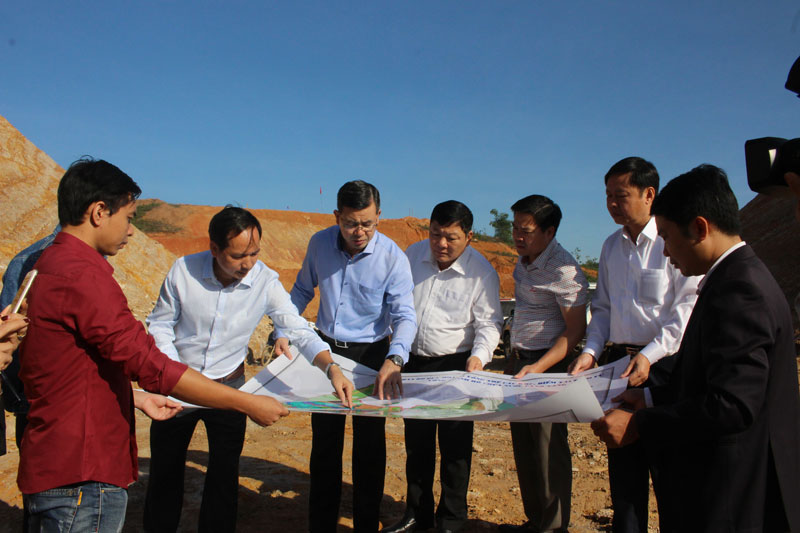
(HBO) – Vice Secretary of the Hoa Binh provincial Party Committee Ngo Van Tuan on October 30 had a working session with the Standing Board of the Party Committee of Lac Son district to review the performance in the first nine months of 2019 and mapped out major tasks and solutions for the remaining months. The meeting also reviewed the implementation of the 26th district Party Congress’ Resolution for the term 2015 – 2020.
 Vice Secretary of the provincial Party
Committee Ngo Van Tuan inspects progress of Canh Tang reservoir project.
Vice Secretary of the provincial Party
Committee Ngo Van Tuan inspects progress of Canh Tang reservoir project.
In the first nine months of the year, Lac Son district
has seen growth in agriculture, industry and handicrafts, trade, and
services. The district has focused on building new-style rural areas, ensured
social welfare and social order – security, and accelerated land clearance at
major projects such as Canh Tang reservoir and the road from Ho Chi Minh
Highway and Highway
12B to Highway 1.
Over the past four years, Lac Son has met and even
surpassed 17 out of 18 goals set in the 26th district Party Congress’
Resolution. The local economy expanded 12 percent from the same period last
year, 32 percent of the communes have earned new-style rural area status
while the poverty rate dropped 6.1 percent.
Concluding
the session, Tuan hailed the district’s nine-month achievements
and the implementation of the 26th district Party Congress’ Resolution.
Regarding the key tasks in the remaining months, he asked for good
preparatory work for the next-term Party Congresses at all levels. He asked relevant
agencies to further promote public administrative reform and improve local
business climate.
He also urged greater efforts to preserve local
cultural identity, improve human resources quality, strengthen social order and
security, and improveplanning and management of land and environmental protection. He
requested the district to further boost economy, build new-style rural areas,
and sustainably reduce poverty.
The district must focus on developing its soil
map to effectively serve the development of agricultural and forestry, transformingproduction towards
chain value, strengtheningmanagement of forest protection,
developing timber plantations, and attracting more
strategic investors.
Ngo Van Tuan and his working delegation later paid a fact-finding
trip to Canh Tang reservoir
project and examine the farming of "cay doi,” a signature product of Chi Dao
commune./.
The Standing Board of the Hoa Binh provincial Party Committee has agreed in principle on a proposal by the Standing Board of the Party Committee of Hoa Binh city to gather feedback on the city’s 1:2000 zoning plan, which forms part of its broader urban development strategy.
Hoa Binh province has made notable progress in public administration reform and digital government development, with the satisfaction index among citizens and businesses reaching over 84%, according to recent government evaluations.
Thanks to great efforts by local authorities in recent times, the governance and public administration performance of Mai Chau district has been significantly improved.
In the afternoon of June 6, the Party Committee, the People's Council, the People's Committee and the Fatherland Front of Lac Son district solemnly held a meeting to celebrate the 139th anniversary of the district's founding (1886–2025) and the 79th anniversary of the establishment of the district's Party Committee (1946–2025). There was the attendance of Mr. Bui Van Thang, the Vice Chairman of the Provincial People's Council; Mr. Quach Tat Liem, the Vice Chairman of the Provincial People's Committee; Ms. Dang Bich Ngoc, the Deputy Head of the National Assembly Delegation of the province; as well as the former leaders of the province and district through various periods, who are the natives of the district.
Implementing the Politburo’s Resolution No. 57-NQ/TW on breakthroughs in science – technology, innovation, and digital transformation is a golden opportunity for the northern mountainous province of Hoa Binh to renew growth model, improve competitive edge and shorten digital gap.
Resolution 57-NQ/TW, issued by the Politburo on December 22, 2024, identifies sci-tech, innovation, and digital transformation as strategic breakthroughs to build a developed and prosperous nation. In Hoa Binh province, this spirit is not just a slogan, it’s being put into action through concrete initiatives that form a "new development triangle”: digital citizenship, digital economy, and digital administration.



 Vice Secretary of the provincial Party
Committee Ngo Van Tuan inspects progress of Canh Tang reservoir project.
Vice Secretary of the provincial Party
Committee Ngo Van Tuan inspects progress of Canh Tang reservoir project.